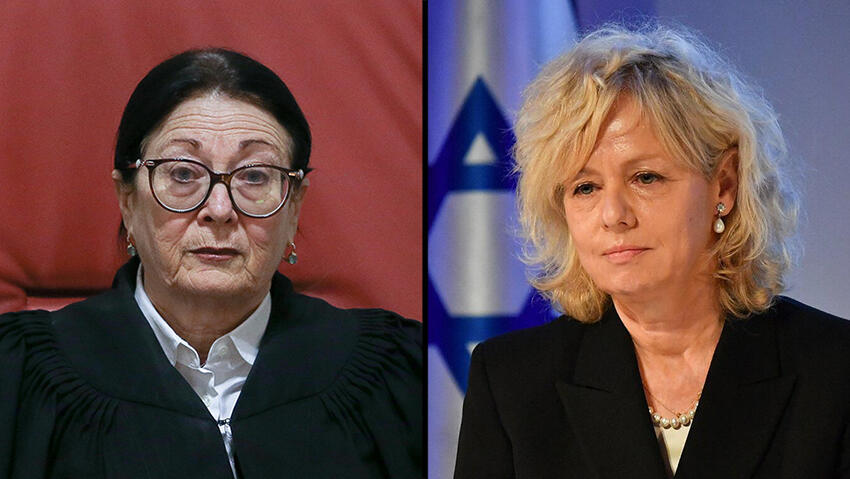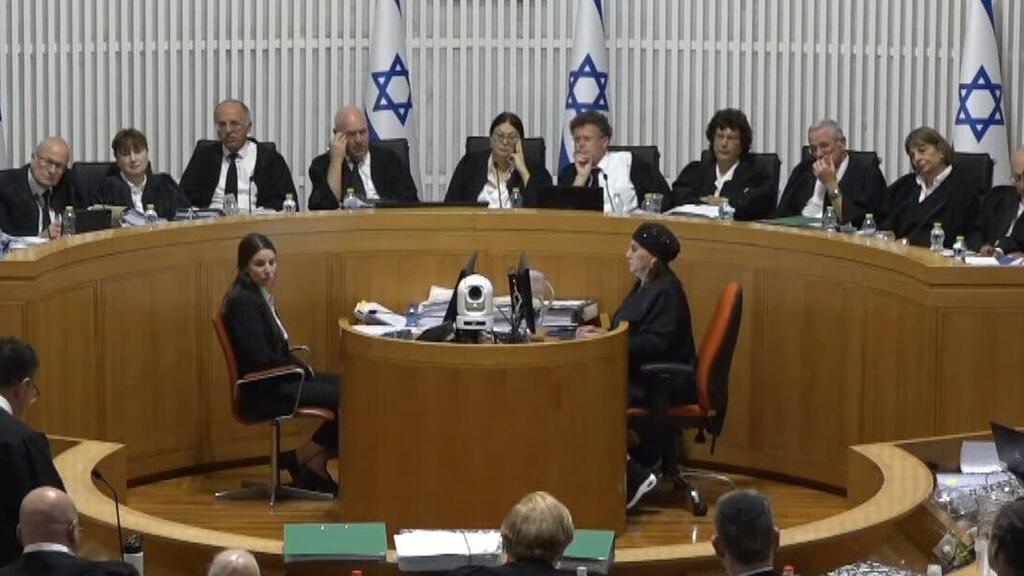The High Court of Justice will hold a second hearing Thursday on the petitions seeking to invalidate the amendment to the Basic Law: The Government, which deals with the removal of a prime minister only in cases of physical or mental incapacitation. The hearing, which will be attended by 11 Supreme Court Justices - including Supreme Court President Esther Hayut, will be broadcast live.
More Stories:
About two months ago, the High Court of Justice issued a conditional order, in which it ordered the state to justify why it should not postpone the entry into force of the law until the next Knesset. The judges claimed that the law was clearly enacted for Prime Minister Benjamin Netanyahu - and therefore has a personal effect. At that time, the court also announced that an expanded panel of justices would participate in the hearing.
The law, enacted quickly after a petition called for Netanyahu to be jailed as his corruption trial goes forward, allows him to violate the conflict of interest rule according to which he is prevented from engaging in judicial reform. Through it, the prime minister can promote far-reaching changes to the justice system while he himself is on trial, without fear of being sent to jail.
What is the amendment to the law?
In March, the coalition passed Amendment No. 12, which narrowed the the law. According to the amendment, the prime minister can only be removed from office if he announces that he is physically or mentally incapable of fulfilling his duties, or in the event that 75% of the members of the government request that he be removed to against his will and it is put to a vote in the Knesset - where a majority of 80 is requried.
The amendment to the law is significant. It does not refer to the removal of a prime minister due to a criminal proceeding and, in fact, takes the authority to do so away from the attorney general. Until the change, the law referred to a situation where the prime minister was "prevented" from fulfilling his role - but did not specify under what circumstances.
What about the previous discussion, in August?
Hayut, the president of the Supreme Court, as well as Vice President Judge Uzi Fogelman and Judge Yitzhak Amit discussed the amendment to the law - and decided that there was a personal motive behind it. They clarified that the High Court of Justice has the authority to judicially review Basic Laws. During the discussion, Hayut said that "the fingerprints (on the law) are very clear."
What do the petitioners claim?
The petitions were submitted by the Movement for Quality of Government and Knesset member Oded Forer (Israel Beiteinu). The Movement for Quality of Government claims that this is a personal amendment that "undermines the regime base in Israel according to which the judiciary balances and restrains the executive and legislative branches - and its establishment is another transition to a dictatorship." The movement also argues against the immediate applicability of the law, explaining that it "creates a new and dangerous precedent. To the extent that it is not within the power of whoever holds the leadership of the government to change the constitutional arrangements, the more he changes them according to his convenience, in view of the casual majority he possesses."
What is the attorney general's position ?
In the previous hearing on the amendment to the law, the legal adviser to the government Attorney General Gali Baharav-Miara argued that it should be disqualified, and in her answer to the conditional order issued by the High Court of Justice - which was issued about a week ago - she believed that its applicability should be postponed at least until the next Knesset . In her answer she wrote that "a Basic Law cannot serve as a kind of private resource that removes problems in the field of moral purity and criminal law." She stated that by postponing the applicability, it will be possible to "shape the arrangement from a broad policing perspective, with a forward-looking view and behind the 'veil of ignorance'."
3 View gallery


Supreme Court President Esther Hayut and Attorney General Gali Baharav-Miara
(Photos: Yoav Dudkevich, Oren Ben Hakon)
The attorney general detailed the sequence of events, and said that after presenting the outline of the judicial overhaul, she informed the prime minister that he is bound by a conflict of interest settlement due to his trial and that he is not allowed to discuss changes in the judicial system. She noted that "on February 20, a few days after the petitions were submitted seeking to remove Netanyahu, after the decisions of the honorable court regarding the submission of responses to the petitions, and after the announcement of the coalition leaders - the proposal of a number of Knesset members from all the coalition factions was placed on the table of the 25th Knesset - Basic Law Proposal: Amendment - Incapacity of the Prime Minister."
From that moment, she explained, Netanyahu began to engage in the judicial overhaul openly. Then the attorney general stated that "amending the Basic Law is intended for a twofold purpose: first, to free the prime minister from restrictions in the field of moral purity and to exempt him from the legal consequences that could arise from violating the duty of acting in conflict of interest. Second, to prevent the honorable court from ruling on petitions against him."
What is the Knesset's position
According to the position of the legal advisor to the Knesset , there is no reason to postpone the date of application of the amendment to the incapacitation law, especially since it is a Basic Law. The consistent position of Knesset legal advisor Sagit Afik is that it is appropriate to establish Basic Laws concerning the relations between the authorities with deferred applicability - that is, to the next Knesset - but since the legislature has expressly chosen to establish the law with immediate applicability, there is no room to interfere with this.
The Knesset's reply states that "Regarding the question of postponing the commencement of the law, the reply describes in detail the procedure for amending Basic Law, which included extensive discussions with the participation of members of the Knesset and other factors, and at the end of which changes were made to the wording following the comments. The arrangement as formulated is better than the incomplete arrangement that existed on the eve of its enactment, and according to the ruling of the honorable court, the judicial review should be based on the purpose of the law, and not on the motives that led to its enactment."
The Knesset's reply also notes that "amending the Basic Law has no effect on the prime minister's conflict of interest settlement, and his obligations under it. The law is balanced, similar in essence and details to the settlement arrangements established for other office holders in Israel, such as the President of the State and the Speaker of the Knesset, and is even similar to the arrangements proposed in the past In this matter. The court has stated many times that the existing law does not prohibit the establishment of Basic Laws with immediate effect, and therefore there is no reason to prohibit it in the current normative situation."
What is the prime minister's response?
Netanyahu replied to the High Court at the end of last week, when he claimed that making the order absolute "is actually likened to a precedent-setting and exceptional intervention in the basic legislation of the constituent authority in a permanent constitutional arrangement, and not an interpretative act. In a liberal-democratic country, leaders are elected and dismissed by the people. Rarely is a leader's tenure terminated other than through impeachment, and this is when the leader loses his ability to function - in cases such as a dramatic loss of physical or mental ability."
According to Netanyahu: "Determining the removal of a leader in democratic countries is done by the leader himself or by the people's elected officials. The petitioners' interpretation of the previous constitutional arrangement, according to which the attorney general or the court can remove an elected prime minister other than for physical or mental reasons is completely contrary to the most basic principles of our constitutional regime. Such an interpretation contradicts the principles of the democratic regime."
In addition, Netanyahu claimed that even Baharav-Miara "does not have any authority to expel an elected prime minister, and there is no authority to determine that such a theoretical possibility will be left standing in complete opposition to the will of the voters and the basic legislation of the constituent authority with an absolute majority of its members. Such a situation is unacceptable, this was not the intention of the founding legislators in the past, and it is not the intention today." He also refrained from answering whether he would obey the High Court in case of interference with Basic Laws.



